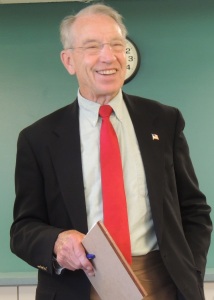
~by Sen Chuck Grassley
Q. What makes the Iowa caucuses unique?
A: Nearly 50 years ago, Iowa launched its first-in-the-nation presidential caucuses and has retained this prominent position since 1972. Every four years, the Hawkeye State becomes the launching pad to the White House as candidates kick-off their campaigns for the presidency, meeting with Iowans in living rooms, diners, schools and of course, the Iowa State Fair.
Well over a century ago, long before presidential candidates looked upon our state with an ambitious gleam in their eyes, the Iowa caucuses began as neighborhood gatherings to discuss and take positions on issues bubbling up in the public square. For the last several decades, local leaders and political parties use the quadrennial caucuses to organize, build momentum, raise money and discuss party business.
The months leading up to the Iowa caucuses reflect retail politics and grassroots government in their purest dimension. For months leading up to the caucuses, candidates hit the campaign trail and answer tough questions from Iowans face to face. On caucus night, neighbors hash out values and visions they want to advance, build coalitions around their preferred presidential candidates, elect convention delegates and vote on policy planks for their party’s platform.
After Jimmy Carter won the Iowa caucuses and catapulted his candidacy to secure the Democratic nomination in 1976, Iowa strengthened its reputation for vetting political candidates and became the go-to state for candidates to test the political waters, get organic feedback from voters, build an organization and grow their message into a movement. Iowans take this civic responsibility seriously and we don’t take the privilege of being first for granted. On Monday, Feb. 3, 2020, all eyes will be on Iowa.
Q. Why should Iowans leave their homes on a cold winter’s night and participate?
A. The caucuses are like the Super Bowl for political activists in Iowa. Each party has a diverse fan base that spans the ideological spectrum. On Feb. 3, caucus-goers will meet at 1,681 precincts across the state to cheer for their preferred candidate and try to persuade friends and neighbors to join their team. In the past few caucuses, candidates look to finish in the top three to gain a bounce out of Iowa to the states that follow.
A strong finish in Iowa builds momentum and helps drive media buzz and raise money to keep the campaign going and growing. This is the moment that supporters who have knocked on doors, attended rallies, organized petitions and donated time and money for their candidate has been anticipating for months. I encourage first-time caucus-goers and long-time participants not to sit on the sidelines.
The Iowa caucuses are the quintessential exercise of civic engagement. It’s a hands-on lesson in civic education and participatory democracy. Iowans have a front row seat to the biggest game of U.S. electoral politics. Don’t take it for granted.
Iowa’s first-in-the-nation caucuses give Iowans and candidates the opportunity to connect on the campaign trail, not just by blanketing the state with advertising. On caucus night, Iowa provides the first litmus test in the presidential contest on the road to Election Day on Nov. 3, 2020.
Electing the leader of the free world is a right and responsibility of citizenship. Iowans who aren’t already registered with a party may register at each political party’s respective caucuses. Find your precinct caucus location here. Iowans who will be age 18 or older by Election Day in November may participate. This year marks the centennial anniversary of the 19th amendment, granting women the right to vote. It’s a good reminder not to take this opportunity for granted. The Iowa caucuses help shape the national debate and inform candidates on the views and issues that matter to Rural America.
As Iowa’s senior U.S. senator, I’m proud to represent Iowans and champion Rural America every day. In 2020, I’ll continue my 40th consecutive year meeting with Iowans in every county, at least once, by the end of the year. Holding Q&A’s with Iowans where they work, attend school and participate in civic life is the essence of representative government. Like the Iowa caucuses, listening and learning from the grassroots strengthens our system of self-government “of, by and for the people.”
